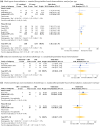Pathological Complete Response Following Different Neoadjuvant Treatment Strategies for Locally Advanced Rectal Cancer: A Systematic Review and Meta-analysis
- PMID: 32524461
- PMCID: PMC7497700
- DOI: 10.1245/s10434-020-08615-2
Pathological Complete Response Following Different Neoadjuvant Treatment Strategies for Locally Advanced Rectal Cancer: A Systematic Review and Meta-analysis
Abstract
Background: Pathological complete response (pCR) following neoadjuvant treatment for locally advanced rectal cancer (LARC) is associated with better survival, less local recurrence, and less distant failure. Furthermore, pCR indicates that the rectum may have been preserved. This meta-analysis gives an overview of available neoadjuvant treatment strategies for LARC and analyzes how these perform in achieving pCR as compared with the standard of care.
Methods: Pubmed, Embase, and Cochrane Central bibliographic databases were searched. Randomized controlled trials in which patients received neoadjuvant treatment for MRI-staged nonmetastatic resectable LARC were included. The primary outcome was pCR, defined as ypT0N0. A meta-analysis of studies comparing an intervention with standard fluoropyrimidine-based chemoradiation (CRT) was performed.
Results: Of the 17 articles included in the systematic review, 11 were used for the meta-analysis. Addition of oxaliplatin to fluoropyrimidine-based CRT resulted in significantly more pCR compared with fluoropyrimidine-based CRT only (OR 1.46), but at the expense of more ≥ grade 3 toxicity. Other treatment strategies, including consolidation/induction chemotherapy and short-course radiotherapy (SCRT), did not improve pCR rates. None of the included trials reported a benefit in local control or OS. Five-year DFS was significantly worse after SCRT-delay compared with CRT (59% vs. 75.1%, HR 1.93).
Conclusions: All included trials fail to deliver high-level evidence to show an improvement in pCR compared with standard fluoropyrimidine-based CRT. The addition of oxaliplatin might result in more pCR but at the expense of more toxicity. Furthermore, this benefit does not translate into less local recurrence or improved survival.
Figures



References
-
- Lutz MP, Zalcberg JR, Glynne-Jones R, et al. Second S.t Gallen European Organisation for research and treatment of cancer gastrointestinal cancer conference: consensus recommendations on controversial issues in the primary treatment of rectal cancer. Eur J Cancer. 2016;63:11–24. doi: 10.1016/j.ejca.2016.04.010. - DOI - PubMed
Publication types
MeSH terms
LinkOut - more resources
Full Text Sources
Medical
Research Materials

